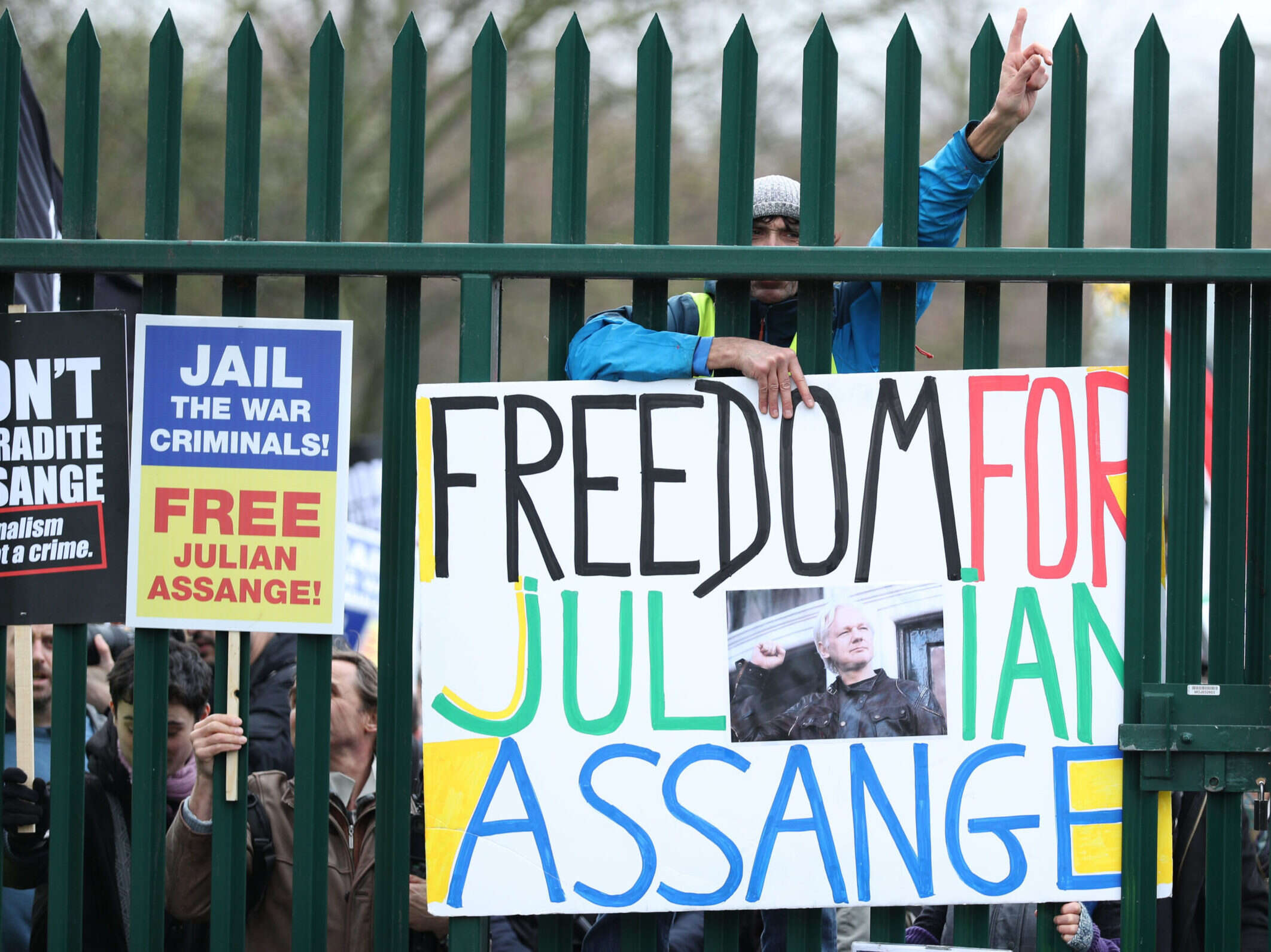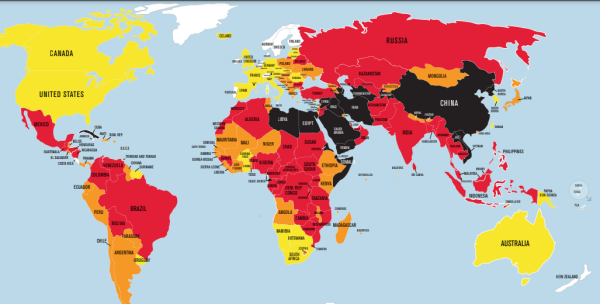
Reporters Without Borders (RSF) has reported a “dramatic deterioration” in access to information and an “increase in obstacles” for journalists during the Covid-19 pandemic in its 2021 World Press Freedom Index ranking.
It said journalists across the world, but particularly in Asia, the Middle East and Europe, are finding it increasingly difficult to investigate and report on sensitive stories.
And the press freedom campaign group questioned whether access to information blocked by authorities during the past year will be restored when the pandemic draws to a close.
RSF secretary-general Christophe Deloire said: “Journalism is the best vaccine against disinformation.
“Unfortunately, its production and distribution are too often blocked by political, economic, technological and, sometimes, even cultural factors. In response to the virality of disinformation across borders, on digital platforms and via social media, journalism provides the most effective means of ensuring that public debate is based on a diverse range of established facts.”
[Press Gazette Media Freedom Health Check: 70% of world’s population has little media freedom]
RSF said although its measure of media freedom worldwide fell by only 0.3% from 2020, it has dropped by 12% since 2013 and is at its lowest point since then.

RSF World Press Freedom Index map 2021
Its evaluation also found that journalism was completely or partly blocked in 73% of the 180 countries ranked in the Press Freedom Index – seriously impeded in 73 countries and constrained in 59 others.
Press Gazette’s own analysis last month uncovered 71 countries with critical media freedom issues, accounting for 70% of the world’s population.
UK World Press Freedom Index ranking 2021
The UK improved by two places in the rankings from 35th to 33rd, its joint best placing (with 2019 and 2014) since it came 29th in 2013.
The improvement came despite “vindictive official reactions” from the Government towards negative reporting of its Covid-19 response, along with concerns over claims of “blacklisting” and vetting of journalists’ Freedom of Information requests.
RSF also cited continuing death threats to journalists in Northern Ireland, and the fact a judge’s decision not to extradite Wikileaks founder Julian Assange was based on his suicide risk rather than ideals of press freedom.
[Read more: Photographer given ‘unlawful’ Covid-19 fine ‘deeply concerned’ about press freedom]
RSF’s analysis said the UK Government’s establishment of the National Committee for the Safety of Journalists and publication of a National Action Plan were “welcome steps” forward.
“Robust implementation of the action plan will be crucial towards establishing a climate in which journalists can work safely and without fear throughout the UK – both online and offline,” it said.
US – World Press Freedom Index ranking 2021
RSF said there were already “healthy improvements” to press freedom in the US, which moved from 45th place to 44th, since Joe Biden stepped into the White House in January.
These included the reinstatement of regular press briefings and previously “muzzled” authorities being authorised to provide accurate information on Covid-19.
However ongoing threats range from “the disappearance of local news to the ongoing and widespread distrust of mainstream media”.
In 2020 nearly 400 journalists were assaulted and more than 130 detained, many as they reported on Black Lives Matter protests.
Police in Minnesota were condemned last week for pepper-spraying and detaining journalists who were covering protests over the police shooting of Daunte Wright.
RSF said: “Trump himself vilified bonafide news outfits as ‘fake news’ and qualified award-winning journalists as the ‘enemy of the people,’ feeding the type of threatening behaviour, including violence and the destruction of equipment, that journalists faced during the uprising against the US Capitol Building on 6 January 2021.
“As dozens of alleged insurrectionists face serious jail time for federal crimes, the erosion of trust in the American media and unchecked conspiracy theories that continue to flourish online will require a concerted effort by all – the public sector and private companies alike – to ensure the long-term sustainability of press freedom in the US.”
Covid-19 impact on World Press Freedom Index 2021
Germany was stripped of its “good” ranking, taking it down two places to 13th, because of attacks from extremists and conspiracy theorist believers at Covid-19 lockdown protests.
Only 12 countries (7%) were ranked “good” – meaning conditions are “at least good if not optimal” – which RSF said was the fewest since the methodology was developed in 2013.
A fifth of countries, including the UK and US, were deemed “fairly good” environments for journalists.
Norway continued to be ranked first place for the fifth year in a row – although RSF noted that its media “have complained of a lack of access to state-held information about the pandemic”.
Some of the countries impacted due to Covid-19 policies include:
- Iran (down one place to 174th), where RSF said authorities tightened their control over news coverage and put journalists on trial to weaken the media’s ability to scrutinise its Covid-19 death toll;
- Egypt (staying in 166th place), where it was forbidden to publish pandemic statistics from any source but the Ministry of Health;
- Zimbabwe (down four to 130th place), where an investigative reporter was arrested after helping to expose corruption in the procurement of Covid-19 supplies.
RSF said the pandemic had “exacerbated the problems that have long plagued the press, which was already in its death throes” in the Middle East’s most authoritarian countries.
Saudi Arabia, Egypt and Syria are among the countries to have taken advantage of the pandemic to “reinforce their methods for gagging the media and to reaffirm their monopoly on news and information”, it said.
[Read 2020 analysis: UK slips down World Press Freedom rankings as Northern Ireland threats continue]
China remains ranked 177th of 180 countries with internet censorship, surveillance and propaganda said to be at “unprecedented levels”. RSF has previously said that if China had a free press the coronavirus pandemic might have been avoided.
Even European countries have tried to control the dissemination of information about Covid-19 in a chilling way, with RSF citing the arrest of Serbian journalist Ana Lalić after a government unit was put in charge of disseminating all information about Covid-19. The new policy was overturned in the outcry following her arrest.
The country that fell the furthest through the rankings was Malaysia, down 18 places to 119 of 180 in part due to the “anti-fake news” decree imposed using emergency powers during the pandemic which sparked fears over its threat to legitimate reporting.
Meanwhile, authoritarian leaders remain a concern: Brazil fell four places to 111th place, going from being classed “problematic” to “bad” as President Bolsonaro and his allies continued the “vilification and orchestrated public humiliation of journalists”.
Picture: Yui Mok/PA Wire
Email pged@pressgazette.co.uk to point out mistakes, provide story tips or send in a letter for publication on our "Letters Page" blog






